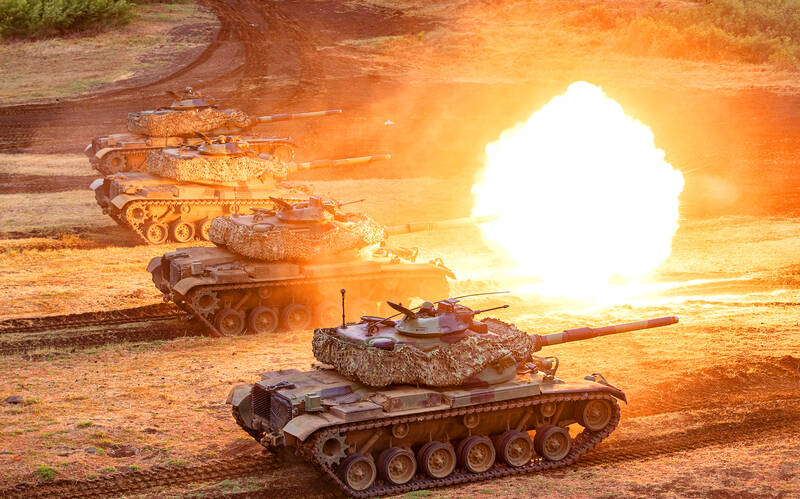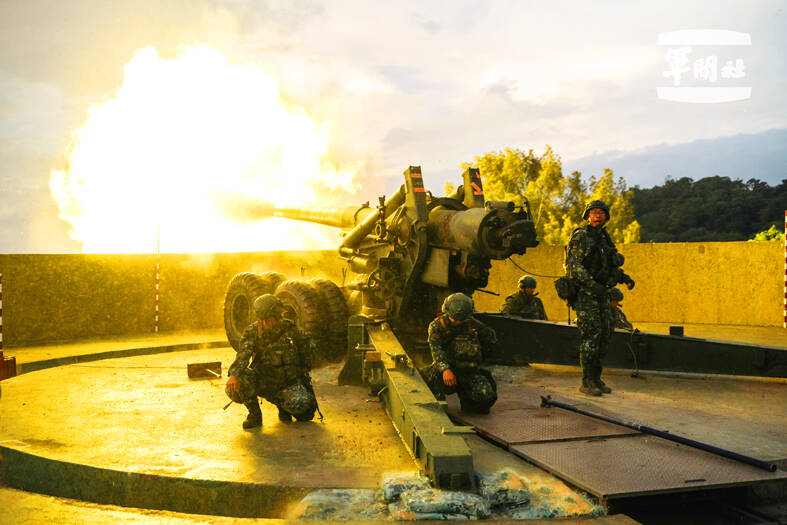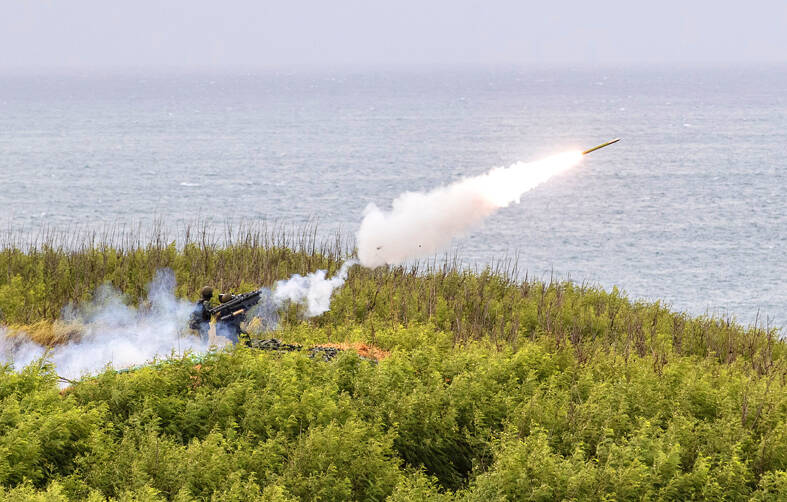Troops stationed on Penghu Islands early yesterday held an anti-landing drill featuring US-made Stinger and Javelin missile defense systems as part of the ongoing Han Kuang exercises.
Army Penghu Defense Command troops fired from the Dual Mount Stinger, a tripod-mounted launch platform for the Stinger missile, and used Javelin portable anti-tank missiles during the drill held on the beachfront.
Soldiers also fired a 155m cannon, 105mm guns and 120mm mortars during the hour-long drill. This served as covering fire to protect troops as M60A3 tanks and CM-21 armored vehicles advanced on the battlefield.

Photo: AP / Military News Agency
The drill was also supposed to include air force jets and naval vessels, but they were canceled due to an approaching typhoon.
Similar live-fire exercises were also held on the Matsu Islands.
Meanwhile, live-fire exercises were canceled in Kinmen, less than 10km from mainland China, as more than 30 merchant vessels were heading to Liaoluo Port (料羅港) so they could anchor and shelter from the typhoon.

Photo: AP / Ministry of National Defense
Major General Cheng Chieh-yuan (鄭傑元), a spokesman for the Kinmen Defense Command, said the exercises were called off due to the vessels being in the target area.
Yesterday was the third day of the five-day around-the-clock live-fire component of the 40th Han Kuang series of exercises that began on Monday.
Due to the approaching Typhoon Gaemi, which was forecast to bring heavy rain and strong winds to almost all of Taiwan yesterday and today, the Ministry of National Defense yesterday said that all exercises scheduled for the remaining days would be canceled to focus on typhoon disaster preparation.

Photo: AP / Military News Agency / Ministry of National Defense
Instead of holding ground drills, troops would hold tabletop war games, the ministry said.
The annual Han Kuang exercises, which have served as Taiwan’s major war games since 1984, consist of live-fire drills and computerized war games, and seek to test Taiwan’s combat readiness in the face of a possible Chinese invasion.
This year’s tabletop exercises were staged in April.

A relatively large earthquake may strike within the next two weeks, following a magnitude 5.2 temblor that shook Taitung County this morning, the Central Weather Administration (CWA) said. An earthquake struck at 8:18am today 10.2km west of Taitung County Hall in Taitung City at a relatively shallow depth of 6.5km, CWA data showed. The largest intensity of 4 was felt in Taitung and Pingtung counties, which received an alert notice, while areas north of Taichung did not feel any shaking, the CWA said. The earthquake was the result of the collision between the Philippine Plate and the Eurasian Plate, the agency said, adding

Snow fell in the mountainous areas of northern, central and eastern Taiwan in the early hours of yesterday, as cold air currents moved south. In the northern municipality of Taoyuan, snow started falling at about 6am in Fusing District (復興), district head Su Tso-hsi (蘇佐璽) said. By 10am, Lalashan National Forest Recreation Area, as well as Hualing (華陵), Sanguang (三光) and Gaoyi (高義) boroughs had seen snowfall, Su said. In central Taiwan, Shei-Pa National Park in Miaoli County and Hehuanshan National Forest Recreation Area in Nantou County saw snowfall of 5cm and 6cm respectively, by 10am, staff at the parks said. It began snowing

Global bodies should stop excluding Taiwan for political reasons, President William Lai (賴清德) told Pope Francis in a letter, adding that he agrees war has no winners. The Vatican is one of only 12 countries to retain formal diplomatic ties with Taiwan, and Taipei has watched with concern efforts by Beijing and the Holy See to improve ties. In October, the Vatican and China extended an accord on the appointment of Catholic bishops in China for four years, pointing to a new level of trust between the two parties. Lai, writing to the pope in response to the pontiff’s message on Jan. 1’s

HOLIDAY EXERCISE: National forest recreation areas from north to south offer travelers a wide choice of sights to connect with nature and enjoy its benefits Hiking is a good way to improve one’s health, the Forestry and Nature Conservation Agency said, as it released a list of national forest recreation areas that travelers can visit during the Lunar New Year holiday. Taking a green shower of phytoncides in the woods could boost one’s immunity system and metabolism, agency Director-General Lin Hwa-ching (林華慶) cited a Japanese study as saying. For people visiting northern Taiwan, Lin recommended the Dongyanshan National Forest Recreation Area in Taoyuan’s Fusing District (復興). Once an important plantation in the north, Dongyanshan (東眼山) has a number of historic monuments, he said. The area is broadly covered by